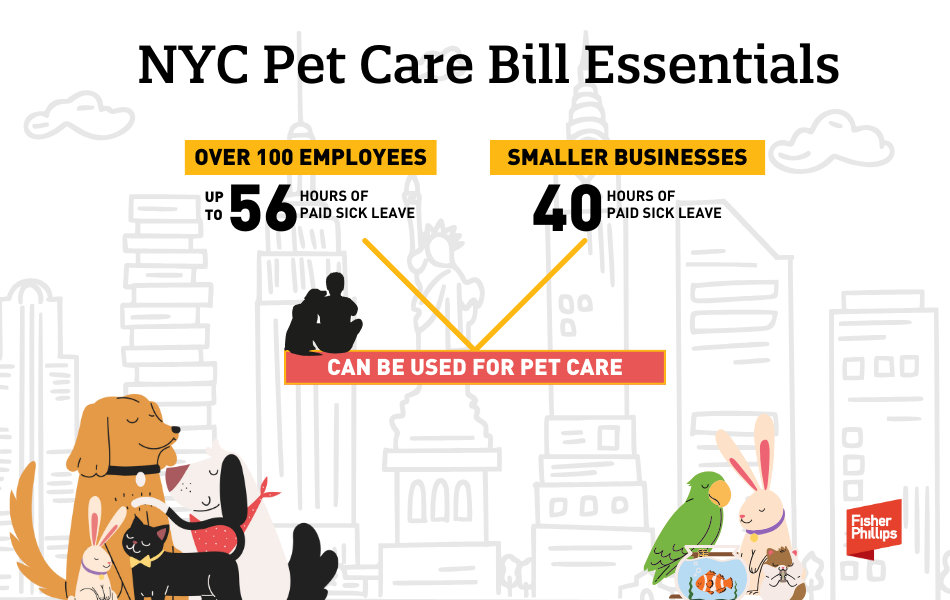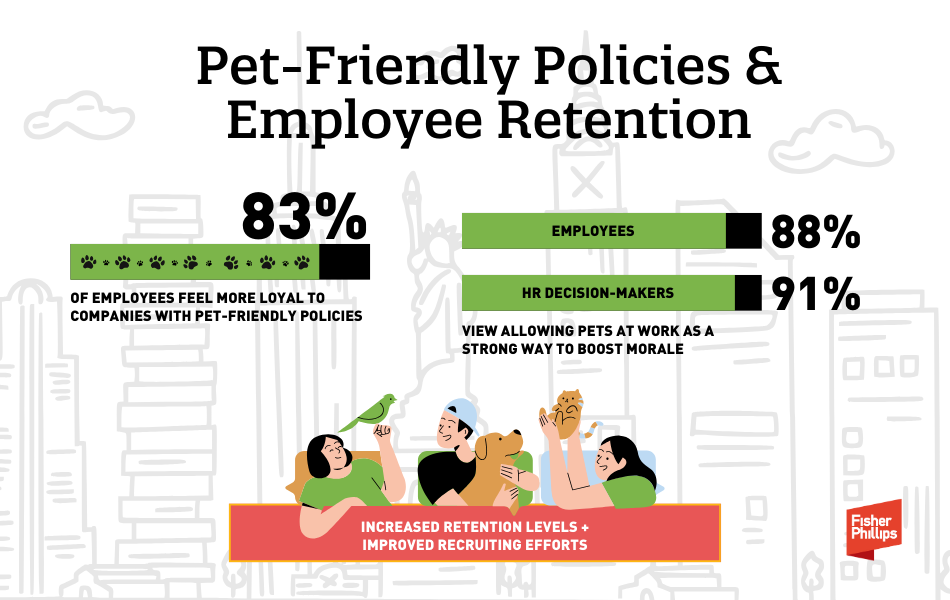Fido’s under the weather? Is Fluffy due for a check-up? A new bill introduced in the New York City Council aims to give employees time off to care for their furry (or scaley or feathered) friends. The proposed measure seeks to amend the City’s existing Earned Safe and Sick Time Act to let workers use sick time for pet-related medical care, including diagnosing and treating illnesses or injuries as well as preventive care. What do you need to know about this proposal and what it signals as part of a larger workforce trend?
Paws for Thought: The Bill Essentials
Councilmember Shaun Abreu, the bill’s sponsor, promotes the measure to enhance the mental health of New Yorkers. He highlights research linking pet ownership to improved mental well-being and reduced depression, arguing that the proposal not only supports pet care but also encourages ownership -- ultimately benefiting both workers’ health and happiness.
The City’s sick leave law currently provides workers at companies with more than 100 employees with up to 56 hours of paid sick leave a year, while those at smaller businesses receive 40 hours. This leave can be used when an employee is ill or to care for a family member. The pending proposal wouldn’t provide additional leave but would allow employees to use their existing sick leave for pet care. For pet owners who consider their furry companions part of the family, this potential change would be a paw-sitive development.

Furry Friends and Paid Leave: A Purr-fect Combination or Barking Up the Wrong Tree?
The proposal is largely unprecedented as a legal mandate. In 2015, Emeryville, CA passed a law allowing employees to use paid sick leave to care for a guide or service dog. If the New York proposal succeeds, it could prompt other cities and states to follow suit.
While laws haven’t yet mandated pet care leave, many companies have taken matters into their own “paws” by voluntarily implementing pet-related policies, such as allowing employees to bring their pets to work or “pawternity” leave. This type of leave provides paid time off for various pet-related responsibilities, including transitioning to pet-owning responsibilities, caring for a sick pet, grieving a deceased animal, or participating in a pet adoption. Companies like Mars Petcare, Mparticle, and Brew Dog offer anywhere from 10 hours of paid leave for a new pet to one to two weeks for rescuing a dog or welcoming a pet into the family.
The types of pet leave vary widely. Some employers provide leave for pet adoption similar to baby bonding leave, recognizing that new pets require time, training and tender loving care that can’t be managed alongside a desk job. Others, like Kimpton Hotel & Restaurants and several California tech companies, offer bereavement leave for the loss of a pet, understanding that many employees feel a profound sense of loss akin to that of a family member.
Fetching Loyalty? How Pets Keep Employees Around
A compelling reason for implementing pet-friendly policies is employee retention. Research shows that 83% of employees feel more loyalty to companies with pet-friendly policies. Furthermore, 88% of employees and 91% of HR decision-makers view allowing pets at work as a strong way to boost morale. Such positive feelings could lead to increased retention levels and improved recruiting efforts, particularly among the younger workforce.

Anecdotally, there’s been an uptick in discussion regarding whether remote workers -- who are already used to sharing office space with four-legged friends – may use bereavement or paid sick leave to address pet-related care. Both the California Employers Association and the California Chamber of Commerce have remarked that they are fielding an increased number of calls and questions regarding “pet leave.”
But Not Everyone’s Wagging Their Tail…
While some businesses embrace pet-care leave, others may approach it with skepticism. Although sick leave generally benefits the workplace, concerns about potential abuse can arise, making it difficult to monitor and leading to lost productivity. Expanding the reasons for using sick leave could further increase the risk of misuse. Additionally, co-workers might feel resentful about having to cover for someone taking time off for a sick pet, and clients may feel neglected if meetings or deadlines are missed due to pet care responsibilities.
Every Dog Has Its Day: Implementing a Policy For Your Company Needs
If you decide to implement your own pet leave policy, make sure to prepare a clear written policy in tandem with your employment counsel that is legally compliant and sets consistent and coherent ground rules. For employers not ready to dive into the deep end of pet leave, consider reminding employees of their existing leave benefits (i.e. vacation time and PTO) that may be used for any reason, including time off to care for their pets. You can read more here about best practices in implementing a policy.
Conclusion
While some might dismiss pet care leave as frivolous, many employers have embraced a workforce where employee’s pets are a high priority. And if Councilmember Abreu’s proposal is successful, it will be legally required for New York City businesses -- and could trigger a new trend in pet-care leave laws.
As New York City considers this novel proposal, it highlights the evolving relationship between work and our furry companions. The bill reflects a growing recognition of pets as valued family members. Ultimately, whether this proposal paves the way for a more pet-friendly future in the workplace or sparks further debate, it underscores the significant role pets play in our lives. Balancing the needs of pets and the demands of the workplace will require careful thought and collaboration between employers and employees.